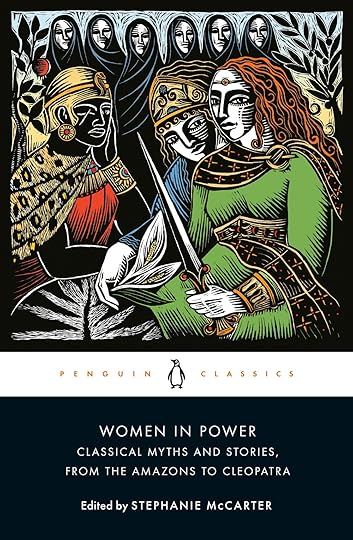Reading the Classics Against the Grain: An Interview with Stephanie McCarter

Women In Power is an anthology of ancient sources regarding just that — powerful women. Under the guiding hand of Prof. Stephanie McCarter, recent translator of Ovid’s Metamorphoses, rich, primary texts with all of their stories, mythologizing, and often misinformation, reveal to readers how the ancient world saw women, and how we still live in those perceptions today. McCarter wrestles directly with these texts to examine how women threatened and continue to threaten western patriarchal systems. I was delighted to have the chance to ask her about this fascinating anthology.
— Mac Chamberlain, Parnassus bookseller
 Prof. Stephanie McCarter
Prof. Stephanie McCarterMac Chamberlain: I am so excited for this anthology! I know from your previous work how thoughtfully you create notes and offer perspectives to readers in an approachable, but elevated way. I am excited for you to extend that grasp into so many new texts that many of us might otherwise never encounter. Can you explain a little bit the process of collecting an anthology? Readers have come to know and love you as a translator, but what was it like identifying texts and deciding which ones had a place in this anthology?
Stephanie McCarter: Thank you for the kind words! The process was very similar to choosing texts for my classes. For many years I have been teaching courses on women, gender, and sexuality in Greco-Roman antiquity at the University of the South in Sewanee, and each semester I have to pick works that speak to the themes I want to emphasize.
This book in fact was motivated entirely by that process. The first time I taught my Women and Gender in Classical Antiquity course (17 years ago!), I wanted to spend a day on the Amazons to get students thinking about the relationship between gender and power, but I couldn’t find a book that assembled readings about these famous mythical figures in an accessible way. There are some great works on Amazons out there (shout out especially to Adrienne Mayor’s fabulous book The Amazons), but none I could find that collected primary sources—and this is true for many of these women. I would have to order many books to make all these texts accessible to my students, so I just decided to put together a volume that general readers would enjoy as well.
It was also really important to me that these stories all be from ancient sources. This means they are all authored by Greek and Roman men, and their perspectives continue to color how we think about these women. This is especially true for someone like Cleopatra, who still intrigues us two millennia after her death. Yet the portrait we have of her is almost entirely from Roman propaganda! I want readers to see more clearly how the stories told about her (and almost all of these women) were tailored to serve male political agendas.
MC: Looking at the names of translators in this anthology, I see that so much of it was a great collaborative effort with colleagues from your university and even drawing from older translations, such as those of Fagles. In addition to the texts themselves, what was the process like of picking translations? Are there any translators featured in the anthology that you want to shout out?
SM: The first step was determining which texts I wanted to include, then I looked to see what translations were already out there. I was thrilled to be able to use some of my favorite existing translations, including Fagles’ edition of Vergil’s Aeneid and Aaron Poochigian’s edition of Apollonius’ Argonautica. Other works needed new translations. I did quite a few of these myself – I’m especially excited about the complete translation of Aristophanes’ Assemblywomen I wrote for the book. It is a comedy in which the wives of Athens disguise themselves as men, infiltrate the Assembly, and vote to give themselves power—with lots of obscene jokes along the way.
For other selections I enlisted the help of colleagues both at Sewanee and elsewhere. The first person to whom I reached out was Erika Zimmermann Damer, a phenomenal scholar of Latin poetry who I knew was interested in translation, and she penned a really lovely rendering of Ovid’s Heroides 7 (a letter purportedly written by Dido to Aeneas). My colleague (and husband!) Daniel Holmes was a stalwart contributor who translated as much as I could throw at him, including some works that simply had no good modern English translation. I’d particularly like to shout out to Paige Graf, an exceptional former Classics student at Sewanee who worked with another of my colleagues, Chris McDonough, to produce a powerful translation Boudicca’s famous speech from Tacitus’s Annales.
MC: You say in the introduction to the anthology that speech is a means of empowerment for women. How do you navigate elevating and empowering the feminine voice in written texts recorded entirely by men?
SM: That’s a fabulous question, especially in the case of this book. The fact is that none of these stories of ancient women in power were written by women—and they all in one way or another strive to discredit the very idea of powerful women. A major part of my motivation was simply to expose the misogyny of these stories and to enable readers to scrutinize why and how they were told. I feel like highlighting the original motives behind these stories can indeed be empowering for women. We can see the narrative strategies that have historically kept women from power, and so we can better combat them.
At the same time, these stories expose the very arenas in which women must strive for power. As you point out, one of these is public speech—these women speak in the Assembly, exhort troops, and practice diplomacy. Other key arenas these women take charge of include sex, the military, and the treasury. It speaks volumes that these continue to be spheres largely controlled by men. These stories also expose potential ways in which women can succeed in acquiring power. In the Assemblywomen, for instance, it takes a group effort of women working together to empower women. There are many lessons for feminist readers if we read these tales with care and largely against the grain of what initially motivated them to be told.
MC: My slightly unfair question that I must ask is who among the women represented is your favorite? Or whose story interests you the most?
SM: At the moment I am the most interested in Amanirenas, who was the queen of Kush (roughly modern Sudan) at the same time Cleopatra was defeated to her north. But very few people know about her! We only have one ancient Roman source for her, in which the writer Strabo tells how her troops attacked Roman settlements to stop Roman expansion into the African continent. She was not defeated, the conflict was settled diplomatically, and Kush never became subject to Roman power or taxation. Amanirenas was hugely successful! But we know so little about her because her success did not serve Roman propaganda in the same way that Cleopatra’s defeat did. Some readers might be frustrated that Strabo’s account takes up a mere page and a half of the book, but that is kind of the point!
One of my favorite aspects of the cover (which was designed by the wonderful Greek-American artist Evangelia Philippidis) is that Amanirenas is restored to her rightful place among the powerful women of the past. She sits alongside the mythical Lydian queen Dido and the historical British queen Boudicca, with Aristophanes’ Assemblywomen in the background. All of these women are brought into alliance.
MC: The final question, one we always ask: what is your favorite thing about indie bookstores?
SM: My favorite thing is how indie bookstores are key hubs for creating literary communities of readers and authors, especially by hosting local writers and stocking their books. It can be so hard to find such community in our increasingly disconnected world. I am so grateful to the indie bookstores that have enabled me to discuss my books with the readers for whom I have written them. Writing can be a lonely business, and indie bookstores are vital points of connection.
Women in Power is on our shelves now. Grab a copy today!
Ann Patchett's Blog
- Ann Patchett's profile
- 27416 followers




